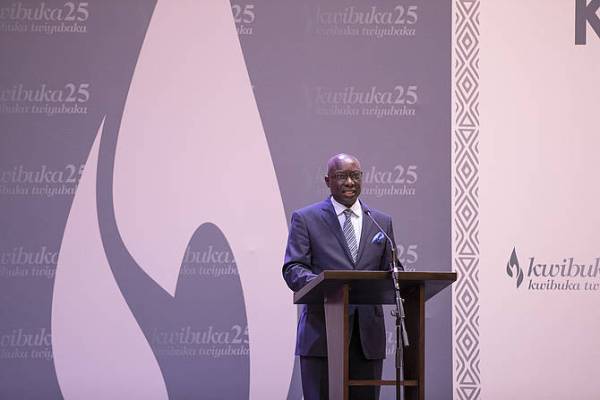
Kigali: While giving his closing remarks at the International Conference on Genocide, this Friday 5th April, Adama Dieng, the United Nations Special Adviser on the Prevention of Genocide, said the 25th anniversary of the Genocide against the Tutsi should not only be a period of commemoration and reflection on what Rwanda has achieved, but also for the international community to ponder what it has done in its quest to prevent similar tragedies anywhere.
He admitted, that in 1994, the United Nations failed Rwanda. “Despite the failure of your friends and your partners, the people of Rwanda have painstakingly demonstrated to the world that life with purpose will always prevail against adversities,” he said.
The UN official said that the country has shown that when justice and reconciliation are promoted with the sincere intention of healing and uniting society, everyone wins
“The UN will continue to work with Rwanda not only in its journey of healing but also as partners for peace and development,” he noted, recognising the role Rwanda has assumed in supporting peacekeeping in war-torn countries around the world.
Dieng, however, expressed concern over on-going conflicts, saying that there was need for the international community to help end conflicts.
The world does not need another Rwanda tragedy to be reminded that indifference to the suffering of others betrays the very foundation and fabric of the collective common humanity, he said.
The two-day international conference on genocide in Kigali ended last evening with calls to sustain what has been achieved in Rwanda for the past 25 years, and for the world to take urgent action in situations that may lead to similar tragedies.
The Minister for Justice and Attorney General, Johnston Busingye, said that what has been achieved over the last quarter century was a result of democratic principles that Rwanda adopted, a model he said was not imported from the west.
“In these 25 years we did not import our democratic governance blueprint from England or Washington or Paris. We negotiated as Rwandans and it is working for us,” he noted.
“That is who we are since 1994. We do not try to become like others, we try to become the best of ourselves, in our context, in light of the history we have been discussing in these two days and the ambitions that we have,” he added.
The minister highlighted that the choices and dynamics of governance that Rwanda chose and continue to choose determine the progress being made.
“Our experience and history show political processes that caused divisionism, intolerance, hatred and violence. Something was profoundly wrong. Continuing with the same and expecting the same results would have been foolish,” he said.
Major General Charles Karamba, the Air Force Chief of Staff at Rwanda Defence Force (RDF) who was among the panelists said that in 1994 humanity was critically attacked in Rwanda, expressing his thankfulness to the leadership of Rwanda Patriotic Army (RPA) for having made a strong plan to liberate Rwanda at a time.
“The liberation came as a result of many factors; absence of humanity fundamentals in Rwanda, economy in a sorry state…, Maj. Gen Karamba said.
“Humanity was under attack and RPF/RPA came to restore the lost humanity”, he explained
The conference brought together scholars and policymakers to discuss perspectives of a post-genocide generation to the imperative of justice as well as preserving memory and sustaining gains in a disruptive age. (End)
